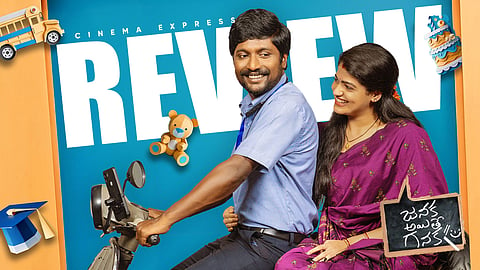Janaka Aithe Ganaka Movie Review: A heartfelt narrative descends into an oversimplified courtroom battle
Janaka Aithe Ganaka review(2.5 / 5)
Sandeep Reddy Bandla’s debut packs in more issues than what a government office usually handles, taking on inflation, corporate politics, and the uphill battle of raising kids. The film starts strong, giving us a clear, relatable viewpoint of a newlywed middle-class man and his uncompromising outlook on life. Bandla and his team shine in their portrayal of the protagonist’s world, from his family dynamics to the small yet significant nuances of a middle-class home. However, the film loses its spark in the courtroom, where it stumbles into a lifeless legal drama. All the intricate groundwork unravels into a shallow, oversimplified portrayal of the law, relying on emotional shortcuts to manipulate us, the middle-class viewers.
Director: Sandeep Reddy Bandla
Cast: Suhas, Sangeerthana, Goparaju Ramana, Vennela Kishore, Rajendra Prasad, Prabhas Seenu and more
Prasad (Suhas), a middle-class family man, contends that the current economic environment is unsuitable for raising children. As a devoted husband, he cherishes caring for his wife (Sangeerthana) and successfully persuades his family that having kids isn't necessary. However, his plans take an unexpected turn when his wife becomes pregnant, leading him to file a consumer lawsuit against the condom company whose products he’s long relied on. In the process, he must not only challenge the greedy corporation but also repair the widening gap between him and his wife, who has grown tired of his uncompromising stance.
What stands out the most in Janaka Aithe Ganaka is the realism with humour it establishes from the start. It’s deeply rooted in the life of the everyday man, meticulously showcasing the details of Prasad’s world—his modest home, his sales job, household duties, and even his salary slips with deductions. The attention to these specifics reflects a genuine effort to go beyond merely labelling him as middle-class; it convinces the audience of his struggles. The highlight of the film is when Prasad drives his father through the society around them to help the latter grasp the financial burdens of raising a child, from birth to the rest of their life—a universally appealing scene. Even the comedy with Vennela Kishore works for the most part. But despite this solid foundation of pragmatism, everything collapses as the film tries to make it a one-dimensional middle class war against the system. Was the film aiming to always reach that revolutionary place? Not really.
All the painstaking effort in building Prasad’s life is tossed aside the moment the story shifts into a courtroom drama. Prasad quits his job, but there’s no explanation for how the household survives. How does he afford legal fees? How does he keep buying Jalebi for his wife, and why doesn’t it spoil as it piles up untouched? These questions arise not from nitpicking logic, but because the film initially takes such care in showing the details. It’s disappointing to see that effort discarded for surface-level emotional highs. For a film marketed as a family drama, it abandons both family and drama in favour of sudden emotional resolutions and hasty political conclusions.
Suhas stands out as one of the most talented and charismatic young actors in the industry today. He has a unique blend of authenticity and cinematic magnetism that captivate audiences from his very first appearance. His facial expressions, even in scenes where he is not the primary focus, are mesmerizing. Yet, the pressing question for an actor of his caliber is why his every project keeps pushing for the monotonous political consciousness and social messages. Despite his remarkable versatility, Suhas risks confining himself to similar narratives of social progress. This would be a profound disappointment, given that he is a true gem—a once-in-a-decade talent. On retrospecting one’s filmography, wouldn’t it be a disappointment if people confuse the film titles for another because both of them had the same story?
The director’s effort to normalise conversations around condoms and contraception is commendable, and Suhas' character handles these topics with a natural ease. Yet, the sudden vilification of abortion as a moral sin leaves the audience bewildered. The wife character is just that—a wife character. Funnily for a film that claims to be inspired from progressive films of other languages (Ayushmann Khurrana's name was uttered by the filmmaker in an interview), the wife character doesn’t even have a name in this film. It’s unclear whether the filmmaker seeks to challenge taboos or reinforce them. If challenging taboos was the agenda, go all in. If an entertaining emotional drama was the intention, again, go all in. But why make it an under-written social awareness program?
Ultimately, it becomes clear that the objective is not about progressive ideas or crafting a gentle family story, but to rehash the overdone trope of the innocent man versus corporate giant to score an easy win. End of the film, unearned emotional resolutions drive the narrative, not social progress.

